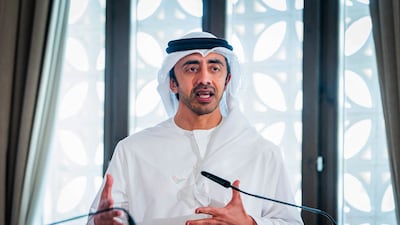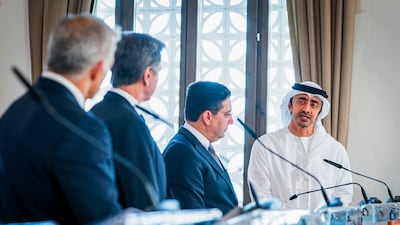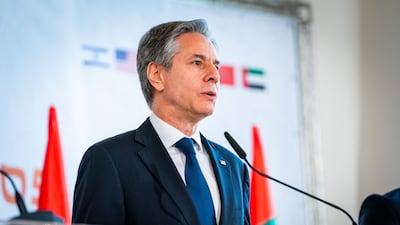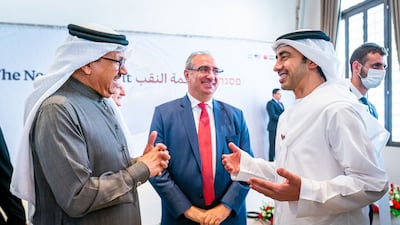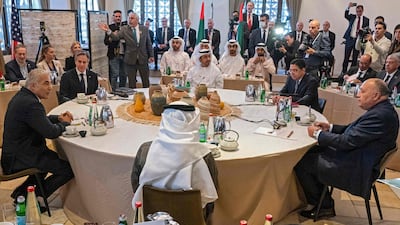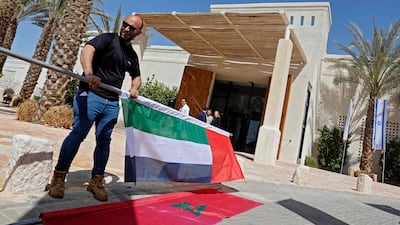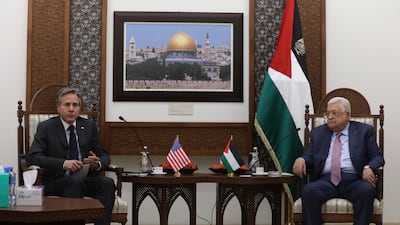Senior officials from the US, Israel, the UAE and three other Arab nations met on Monday to discuss the next steps after the Negev Summit was held in March.
Representatives from the six nations — including Bahrain, Morocco and Egypt — met outside Manama to formalise commitments made in the Israeli desert three months ago.
Israel was represented by Foreign Ministry director general Alon Ushpiz and deputy director general Oded Joseph.
"Through the Negev Summit, we are creating a real and positive change in energy, health, food and water security, regional security and so much more," Mr Ushpiz said in the resort town of Zallaq in southern Bahrain.
Ministry of Foreign Affairs, Bahrain
Yael Lempert, US Deputy Assistant Secretary of State for Near Eastern Affairs, led the American delegation.
The US State Department said on Twitter that it would “build on the Negev Summit in March … to advance a common vision for the region”.
For Bahrain, Ambassador Sheikh Abdulla bin Ahmed Al Khalifa, undersecretary at the foreign ministry, led his delegation.
For the UAE, Abdulrahman Al Neyadi, director of the Policy Planning Department at the foreign ministry, was present.
Morocco's Fouad Yazourh, director general of political affairs, represented his government.
For Egypt, Mohamed Tharwat Selim, deputy assistant foreign minister, represented his government.
In a joint statement after the meeting, the six parties said: "This meeting demonstrates the strength of our relations, our shared commitment to cooperation, and the important opportunities unlocked by improved relations between Israel and its neighbors, showing what can be achieved by working together to overcome shared challenges.
"The participants also affirmed that these relations can be harnessed to create momentum in Israeli-Palestinian relations, towards a negotiated resolution of the Israeli-Palestinian conflict, and as part of efforts to achieve a just, lasting and comprehensive peace."
Sheikh Abdulla, Bahrain's representative, added: "This forum built upon the foundations laid at the meeting of foreign ministers at the Negev Summit hosted by the State of Israel in March of this year.
"At today’s meeting we explored opportunities for cooperation in relation to several fields of common interest. Bahrain remains committed to working closely with others, in the region and beyond, to promote constructive dialogue that leads to stability and peace.”
In March, the six nations agreed to form six working groups — on regional security, energy, food and water security, health, education and tolerance, and tourism — aimed at forging closer ties.
The Negev Summit has been seen as the next step of the Abraham Accords, designed to forge stronger ties after relations were normalised between Israel and its Arab neighbours.
Abdulla Aljenaid, a Bahraini political commentator, said that the six countries that met face many of the same issues, such as food imports, energy costs and the threat posed by Iran.
"This is a significant move by regional countries, orchestrating a new geopolitical situation that is addressing all of the, let's say, threats [that we together face]," he said in a television interview.
He said the six partners are developing a "joint vision and positions on a lot of issues, including the Iranian nuclear issue".
The next steps include each of the six Negev Summit nations leading a working group and meeting two or three times each year, israel's Oded Joseph told Israel media ahead of the meeting.
An annual meeting of foreign ministers will cement progress, he said, while Israel will host a another steering committee later this year.
Keeping Iranian behaviour in check, including its nuclear programme, and holding dialogue over the unresolved Israeli-Palestinian conflict are also key parts of the Negev agreement.
Mr Joseph said the meeting was an important one before US President Joe Biden's visit to Saudi Arabia on July 15 to July 16.
“The presence of the American delegation will be very important, as well as the arrival of President Biden to this region and, specifically, his visit to Israel, from our view, will be an important part of what has been taking shape in the region for the past year and a half,” he said.
Mr Biden will travel to Israel, the Israeli-occupied West Bank and Saudi Arabia from July 13 to 16 - his first trip to the Middle East since taking office 18 months ago.









